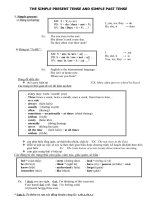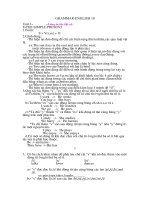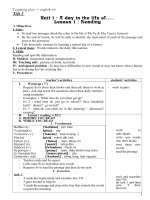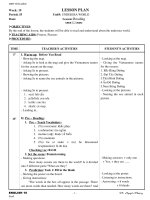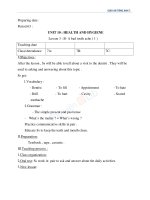giáo án tiếng anh 10 unit 10 - conservation
Bạn đang xem bản rút gọn của tài liệu. Xem và tải ngay bản đầy đủ của tài liệu tại đây (668.8 KB, 14 trang )
GIÁO ÁN TIẾNG ANH LỚP 10.
Date of preparing:………………………
Date of teaching: + 10A2: ……………….
UNIT 10
CONSERVATION
Period 60: A. READING
I/ Objectives
1. Educational aims: through the lesson, students will be able to:
Enrich their vocabulary by guessing meaning in context.
Understand the content of the text
Do the exercises of matching, T/F sentences and choosing main idea
2. Skill: reading for gist and specific information
3. Attitude: protect the environment and animals
II/ Method
Communicative approach
III/ Teaching Aids
Teacher’s book
Text book
Pictures
IV/ Procedure
1. Class Organization
Greeting
Checking the attendance
2. checking old lesson:
- Rewrite the structure of should, conditional sentence type I, give examples
3. New lesson: A. READING
Teacher’s Activities Students’ Activities Content
- Ask Ss to answer the
questions:
- Lead to the new lesson:
Today, we will learn a lesson “
Conservation” to understand
more about the ways we can
do to protect the endangered
animals
- Answer in
individuals
- Listen to the
introduction
Warm up
–
Lead in
(5ms)
1. Are whales or dolphins endangered?
2. What can we do to protect them?
ACTIVITY 1 : BEFORE YOU READ (6 ms)
- Ask Ss to look at the pictures,
ask and answer the questions
in pairs
- Call on some pairs to give
answers
- Correct the answers
- ask and answer
the questions in
pairs
- Give answers
- Listen carefully
1
. Look at the pictures and answer the
questions
ACTIVITY 2 : WHILE YOU READ(25 ms)
- Ask Ss to listen to the tape
and underline new words
- Give and explain some new
words
- Read words and ask Ss to
repeat.
- Ask Ss to read the passage,
get information, and prepare
for Tasks.
- Ask Ss to explain the
requirement
- Ask Ss to work
independently to do task 1 in 2
ms
- Have Ss compare the answers
with a friend
- Call Ss to match and explain
- Feedback and give the correct
answers
-Read words and ask Ss to
repeat
- Ask Ss to explain the
requirement of Task 2
- Ask Ss to read the sentences
first, T explains the new words
if any
- Ask Ss to work in
individuals, read the passage
again and decide
- Ask Ss to compare the
answer with other pairs
- Call some Ss to give answer
in front of the class and
explain
-Listen to the tape
and underline new
words.
- Listen to the
teacher and repeat
after teacher’s
reading
- Read silently
- Explain the
requirement
- Work individually
and do the task
- Compare the
answers with a
friend
- Read aloud their
matching in front of
the class and
explain
- repeat
- Explain the
requirement
- Read sentences
- Work in
individuals, read
the passage and
decide
- Compare the
answers
- Answer in front of
the class and
explain
1
. New words and phrases (7 ms)
- destroy (v)
- destruction (n)
- variety (n)
- supply (n)
- conserve (v)
- conservation (n)
- worsen (v)
- pass law
- species (npl) /'spi:∫i:z/
2. Tasks (18 ms)
Task 1 : Matching
* Suggested answers
1.c ( eliminate /i'limineit/ = remove or get rid
of completely)
2. a ( circulation /,sə:kju'lei∫n/ = the movement
of something around a closed system)
3. d (run-off = liquid which flows off from
something )
4. b ( hydroelectric /,haidroui'lektrik/ =
concerning or producing electricity by the
power of falling water)
Task 2 : T/ F Sentences
- vegetation /vedi'tei∫n/ thuc vat
- erosion (n) / i'roun/
* Suggested answers :
1. T ( paragraph A, sentence 2)
2. T ( paragraph A, sentence 3)
3. T ( paragraph B, sentence 5)
4. T ( paragraph C, sentence 1)
5. F ( paragraph b, sentence 5,6) ( without
plants, most water would run off as soon as it
falls. Rapid run off would cause floods)
6. F ( paragraph C, sentence 6) ( we can stop
worsening the problem)
- Feedback and give correct
answers
. Consolidation, homework (2ms)
- Summarize the main contents of the lesson
- Learn by heart words
- Prepare next lesson: reading (task 3+ after you read)
5. Drawing experience:
…………………………………………………………………………………………………
…………………………………………………………………………………………………
…………………………………………………………………………………………………
***********************************
Date of preparing:………………………
Date of teaching: + 10A2: ……………….
UNIT 10
CONSERVATION
Period 61: A. READING
I/ Objectives
1. Educational aims: through the lesson, students will be able to:
Enrich their vocabulary by guessing meaning in context.
Understand the content of the text
Do the exercises of matching, T/F sentences and choosing main idea
2. Skill: reading for gist and specific information
3. Attitude: protect the environment and animals
II/ Method
Communicative approach
III/ Teaching Aids
Teacher’s book
Text book
Pictures
IV/ Procedure
1. Class Organization
Greeting
Checking the attendance
2.Checking old lesson:
Rewrite the vocab in the previous lesson
3. New lesson: A. READING
Teacher’s Activities Students’ Activities Content
- Ask Ss to name the pictures
- Lead to the new lesson:
Today, we will continue with
the lesson on “ Conservation”
to understand more about the
ways we can do to protect the
endangered animals
- Answer in
individuals
- Listen to the
introduction
Warm up
–
Lead in
(5ms)
1. electric dam
2. elephant
3. monkey
ACTIVITY 1 : BEFORE YOU READ (6 ms)
- Give and explain some new
words
- Read words and ask Ss to
repeat.
- Listen to the
teacher and repeat
after teacher’s
reading
New words and phrases
- medicine (n)
- run-off (n)
- valuable (a)
- impossible (a)
- damage (n)
- disappearance (n)
- disappear (v)
ACTIVITY 2 : WHILE YOU READ
- Ask Ss to read the passage,
get information, and prepare
for Tasks.
- Ask Ss to explain the
requirement
- Ask Ss to work in groups,
read text again and find the
main idea for each paragraph
- Call on some Ss of each
group to give answer and
explain
- Correct
- Read silently
- Explain the
requirement
- work in groups
and do the task
- answer
Task 3: choosing the main idea
- Paragraph A: Forests give us a lot of
valuable things
- Paragraph B: vegetation can help conserve
water
- Paragraph C: Let’s do something to save
the earth
ACTIVITY 3 : AFTER YOU READ
- Ask Ss to work in groups,
answer the question
- Go round and provide help
- Call some Ss to answer in
front of the class
- Feedback
- Work in groups
- Answer in front of
the class
Answer the questions
* Suggested answers
1. The loss of much forest is destroying
the earth.
2. Man and most animals need a
constant supply of water to live.
Farmers need water for their crops.
3. We should stop polluting rivers and
seas and stop the disappearance of
plants and animals
4. Consolidation, homework (2ms)
- Summarize the main contents of the lesson
- Learn by heart words
- Prepare next part: speaking
5. Drawing experience:
…………………………………………………………………………………………………
…………………………………………………………………………………………………
…………………………………………………………………………………………………
Date of preparing:………………………
Date of teaching: + 10A2: ……………….
UNIT 10
CONSERVATION
Period 62: B. SPEAKING
I/ Objectives
1. Educational aims: by the end of the lesson, students will be able to:
Know the way to contribute their parts to protect environment after doing tasks
2. Skill: expressing information and speaking for details
3. Attitude: protect the animals
II/ Method
Communicative approach
III/ Teaching Aids
Teacher’s book
Text book
Pictures
IV/ Procedure
1. Class Organization
Greeting
Checking the attendance
2.Checking old lesson:
Rewrite the vocab in the previous lesson
3. New lesson: B. SPEAKING
Teacher’s Activities Students’ Activities Content
- Show a picture of a part of a
national park and pictures of
some endangered species and
asks questions :
- Gather ideas and lead in
- Answer
individually
1. We can see
animals and plants
living in their
natural habitats .
2. It means not
“doing harm to the
natural
environment”
- Listen to the
introduction
Warm up
–
Lead in
(5ms)
1. What can you see in a national park ?
2. What does “friendly with nature” mean ?
ACTIVITY 1 : PRE – SPEAKING (8 ms)
- Read the requirement and
ask Ss to explain the
requirement
- Read the paragraphs and
explain some new words
- Ask Ss to work in pairs, read
the paragraphs carefully
answer the questions
- Explain the
requirement
- Listen to and
write down
- Work in pairs,
read the paragraphs
and answer the
Task 1: Read the paragraphs and answer
the questions.
- Sensitive(a)/ 'sensətiv/ nhạy , nhạy cảm
- imprison (v) / im'prizn/ giam cầm
- reconstruct (v) / 'ri:kən'strkt/ : xây dựng lại
- breed (v) /bri:d/: nuôi dưỡng, nhân giống
- reintroduce (v) /ri:ntrə'djus/ :giới thiệu lại, đưa
về môi trường tự nhiên
- Call some pairs to ask and
answer
- Feedback
questions
- Ask and answer in
pairs in front of the
class
* Suggested answers :
1.
They are opened to help endangered
species develop.
2.
The animals are not kept in cages. They
can live in their natural environment.
ACTIVITY 2 : WHILE – SPEAKING
- Instruction: Following are
some ideas about the new kind
of zoo discussed in task
1.
You
are required to show your
agreement or disagreement by
ticking the right box. Then
share your ideas with a partner.
- Review some structures of
asking and giving opinions
- Ask Ss to work in pairs
- Go round to observe and
offer helps
- Call on some representatives
of groups to talk about their
ideas
- Comment and correct the
answers
- Explain the requirement or
instruct: You are going to
discuss the advantages and
disadvantages of the new kind
of zoo using the cues provided
in the textbook
.
- Ask Ss to work in groups to
discuss the advantages and
disadvantages
- Help Ss by giving questions
- Listen to the
instruction
- Notice and write
down
- Work in pairs and
do the task
- talk about their
ideas
- Listen to the
instruction
- Work in groups to
do Task 3
- Notice the
questions
Task 2:
Showing agreement or
disagreement about the new kind of
zoo
* Asking for opinions
- What do you think about ….?
- What is your opinion on ….?
- How do you feel about ….?
- Do you agree with
?
* Giving opinions
- In my opinion, I think ….
- I think / I suppose that …
* Showing agreement
- Yes, I think so
- I agree with you
- I suppose you are right
* Showing disagreement
- No, I don’t think so. I think ….
- No, that’s not good idea because…
- Yes, but
Task 3: Discussing the advantages and
disadvantages of zoos of the new kind
- Do you think the animals can live better
in the zoos of the new kind?
- Is it cheap to reconstruct the animal’s
natural environment?
- Where can you see the animals of
various kinds, including wild animals?
- Do the keepers of the zoo have any
danger?
ACTIVITY 3 : POST – SPEAKING
- Ask Ss to prepare to report on
the group’s discussion
- Call on some Ss to report
what their groups have
- Prepare to report
Task 4: Report
discussed
- Comment and give marks
- Report in front of
the class
4. Consolidation, homework (2ms)
- Summarize the main contents of the lesson
- Learn by heart words
- Prepare next part: listening
5. Drawing experience:
…………………………………………………………………………………………………
…………………………………………………………………………………………………
…………………………………………………………………………………………………
********************************
Date of preparing:………………………
Date of teaching: + 10A2: ……………….
UNIT 10
CONSERVATION
Period 63: C. LISTENING
I/ Objectives
1. Educational aims: through the lesson, students will be able to:
listen to get specific information about forest fires
talk about the causes of forest fires and ways to prevent
2. Skill: listening for specific information
3. Attitude: take action to prevent forest fire
II/ Method
Communicative approach
III/ Teaching Aids
Teacher’s book
Text book
Cassette player and tape
IV/ Procedure
1. Class Organization
Greeting
Checking the attendance
2.Checking old lesson:
- Rewrite the vocab in the previous lesson
3. New lesson: C. LISTENING
Teacher’s Activities Students’ Activities Content
- Ask Ss some questions:
1. Have you ever seen any
fire?
2. How was the fire? Was it
terrible?
3. Did you know why the fire
happen?
- Listen to the
questions, think and
answer
individually.
Warm up
–
Lead in
(5ms)
- Introduce new lesson: Today,
we’ll listen to the tape to get
some information about the
forest fire
- Listen to the
introduction
ACTIVITY 1 : BEFORE YOU LISTEN(8 ms)
- Ask Ss to work in pairs and
talk about what may cause a
forest fire
- Call some Ss to give the
causes
- Preteach some words related
to the listening part
- Read aloud words and ask Ss
to repeat
- talk about the
cause of forest fire
in pairs
- Answer
- Notice and write
down
- Listen and repeat
Work in pairs
: talk about what may
cause a forest fire
Listen and repeat
- forest (n) /'frist/
- forester (n) /'fristə/
- campfire (n) /kæmp'faiə/
- destroy (v) / di'stri/
- valuable (a) /'væljuəbl/
- awful (a) /':ful/
- heap (n) /hi:p/
- heap of leaves
ACTIVITY 2 : WHILE YOU LISTEN (24 ms)
- Introduce : You will hear a
passage about forest fires.
Listen and do the tasks
- Ask Ss to explain the
requirement of Task 1
- Instruct Ss: we will listen to
the tape about whales and
number the events in the order
you hear
- Ask Ss to read the statements
and be sure that all the students
understand them
- Play the tape and ask Ss to
listen and do the task.
- Ask Ss to discuss with
friends about the answers.
- Call some Ss to give their
answers
- Play the tape again and ask
Ss to check their answers
- Correct
- Instruct Ss: you will listen to
the tape again and decide
whether the statements are
True or False
- Ask Ss to read the sentences
carefully
- Listen to the
introduction
- Explain the
requirement
- Listen to the
instruction.
- Read the
statements
- Listen to the tape
and do the task
- Discuss in pairs
- Give answer and
explain
- Listen again and
check
- Listen to the
instruction
- Read
the sentences
carefully
Task 1 : Events Ordering
* Suggested answers
3 – 2 – 5 – 1 – 4
Task 2 : T/F Sentences
* Suggested answers
1. F (It spreads quickly)
2.
F (In late summer)
.
3.
T
4.
T
- Play the tape and ask Ss to
listen and decide
- Ask Ss to compare the
answers with a friend
- Call some Ss to read aloud
their answers and explain
- Play the tape again and give
correct answers
- Explain the requirement
- Ask Ss to read the sentences
and notice the difference
between them
- Play the tape and ask Ss to
tick
- Ask Ss to discuss the answers
with a friend
- Call some Ss to give answers
- Check
- Listen to the tape
and decide
- Compare the
answers with a
friend
- Give the answers
- Listen again and
check
- Listen to the
explanation
- Read sentences
carefully
- Listen to the tape
and tick
- Discuss
- Give answers
5.
F (It is the duty of everyone of us/
every camper)
Task 3 : Choosing the sentences you
hear
* Suggested answers
1. a
2. b
3. a
ACTIVITY 3 : AFTER YOU LISTEN(5 ms)
- Ask Ss to work in pairs
- Call some Ss to present in
front of the class
- Work in pairs
- Present in front of
the class
Work in pairs : Say how a forest fire
may start and what every camper
ought to remember
4. Consolidation, homework (2ms)
- Summarize the main contents of the lesson
- Learn by heart words
- Prepare next part: writing
5. Drawing experience:
…………………………………………………………………………………………………
…………………………………………………………………………………………………
…………………………………………………………………………………………………
***********************************
Date of preparing:………………………
Date of teaching: + 10A2: ……………….
UNIT 10
CONSERVATION
Period 64: D. WRITING
I/ Objectives
1. Educational aims: through the lesson, students will be able to:
Know how to give suggestion
Write a letter of invitation
2. Skill: Writing for gist and specific information
3. Attitude: making suggestion in communication.
II/ Method
Communicative approach
III/ Teaching Aids
Teacher’s book
Text book
IV/ Procedure
1. Class Organization
Greeting
Checking the attendance
2.Checking old lesson:
Rewrite the vocab in the previous lesson
3. New lesson: D. WRITING: A LETTER OF INVITATION
Teacher’s Activities Students’ Activities Content
- Give a set of words and ask
Ss to make a completed
sentence
- Call some Ss to read aloud
their sentences
-Ask some questions:
What is the purpose of this
sentence? Or When do you use
this sentence?
- Introduce new lesson: Today,
we will learn to write a letter
of invitation
- Make sentence
- Read aloud the
sentences
- Answer the
questions
- Listen to the
introduction
Warm up
–
Lead in
(5ms)
dinner / evening/ for/go/out/this/to
/you/would?
-> Would you like to go out for dinner this
evening.?
ACTIVITY 1 : PREPARATION AND PRESENTATION (10 ms )
- Ask Ss to explain the
requirement
- Read the columns and
explain some new words if any
- Ask Ss to look at column A,
then T explain the verb form
after these structures
- Ask Ss to work in pairs to
match
- Ask Ss to compare the
answer with other pairs
- Call on some Ss to give
answer
- Read the completed
sentences again and check
- Explain the
requirement
- Listen to the
teacher and then
write down new
words on the
notebook
- Notice column A,
write down the
structures
- Work in pairs and
match
- Compare
- Answer
- Notice
Task 1
:
Matching
-
Let’s + V- bare infinitive
-
Why don’t you + V- bare infinitive …?
-
Would you like + to V…?
-
Do you feel like + V-ing …?
-
Can you + V- bare infinitive…?
-
How about + V-ing …?
-
Shall we + V- bare infinitive…?
-
Are you free + to V…?
* Suggested answers
1. c 2. f/h
3. a 4.g / d
5. h /f
6. d/g
7.
e
8. b
ACTIVITY 2 : PRACTICE (18 ms)
- Ask Ss to explain the
requirement
- Ask Ss to work in individual,
read the letters and find the
suitable in Task 1 to complete
the letters
- Ask Ss to share the answer
with a friend
- Call some Ss to read their
letters
- Correct
- Explain the requirement
- Ask Ss to read the cues
carefully.
- Remind Ss that they should
use the suitable tenses and
language items
- Ask Ss to write individually
- Ask Ss to exchange their
letters
- Explain the
requirement
- Work in
individual and
complete the letters
- Exchange the
answer
- Read the letters
- Listen carefully
- Read the cues
- Notice and
remember
- Write letter
- Exchange the
writings
Task 2 : Letter completion
* Suggested answers
1. Are you free
Would you like
2. - Would you like/ Are you free
- How about/ Do you feel like
3. Can you/ why don’t we/ Shall we?
Task 3 : Writing a letter
ACTIVITY 3 : PRODUCTION (10 ms)
- Call on 2 Ss to go to the
board and write down the
letters
- Check and correct the
mistakes
- Write down the
letters on the board
* Suggested answers
Dear Lam,
We haven’t met you since you moved. I miss
you a lot.
We are both having some days off between
the 2 terms soon. If you haven’t made any
other plans why don’t we spend a weekend
together? Do you feel like visiting the forest
near my grandparent’s house again? It looks
quite different now because very many young
trees have been planed at the Tree-Planting
festivals.
Do come if you find it possible and I’ll make
all the preparations.
Please send my love to your parents
Your friend,
Nam
4. Consolidation, homework (2ms)
- Summarize the main contents of the lesson
- Learn by heart words
- Prepare next part: LANGUAGE FOCUS
5. Drawing experience:
…………………………………………………………………………………………………
…………………………………………………………………………………………………
…………………………………………………………………………………………………
***********************************
Date of preparing:………………………
Date of teaching: + 10A2: ……………….
UNIT 10
CONSERVATION
Period 65: E. LANGUAGE FOCUS
I/ Objectives
1. Educational aims: through the lesson, students will be able to:
Distinguish and pronounce the sounds /b / and / p/ correctly
Understand the usage of the passive voice appropriately
2. Skills: do exercises.
3. Attitude: use language in communication correctly.
II/ Method
Communicative approach
III/ Teaching Aids
Teacher’s book
Text book
Cassette player, tape
IV/ Procedure
1. Class Organization
Greeting
Checking the attendance
2.Checking old lesson:
Rewrite the vocab in the previous lesson
3. New lesson: E. LANGUAGE FOCUS
Teacher’s Activities Students’ Activities Content
ACTIVITY 1: PRONUNCIATION (10 ms )
- Give words included sounds,
read aloud these words,
pronounce these sounds
clearly and slowly
- Call Ss to read words and
help them to distinguish them
- Instruct the way to pronounce
- Play the tape and ask Ss to
repeat words
- Call some Ss to read sounds
clearly
- Play the tape
- Ask Ss to underline words
included sounds in sentences
- Listen carefully
- Read words
clearly
- Notice
- Listen and repeat
words
- Read sounds
- Listen
- Listen and
underline words
Introduce sounds and ways to
distinguish them
- / b/:
Ex: bear, ban, ball, bomb, boy…
-
/ p/
Ex: poor, permit, pant, p
ocket…
Practice
- Call some Ss to read
sentences
- Correct
- Read aloud
sentence by
sentence
ACTIVITY 2 : GRAMMAR AND VOCABULARY (30 ms)
- Give examples
- Ask Ss to analyse the
examples
- Give the meaning, form and
use of the passive voice
- Ask Ss to work individually
and choose the right form of
the verbs in brackets
- Ask Ss to compare the
answers with a friend
- Call some Ss to give their
answer
- Feedback and give correct
answers
- Ask Ss to do Task 2
- Call some Ss to report in
front of the class
- Feedback and give correct
- Notice
- Analyse
- Write down
- Work in
individual, do
exercise 1 as the
requirement
- Compare the
answers with friend
- Give the answers
- Notice
- Do task 2
- Report
I/ The Passive Voice
Ex: - The cat chases the mouse
The mouse is chased by the cat
Form: Be + V3/ Ved
Meaning: passive
Use: The passive is mainly used in three
ways:
when we don't want to take
responsibility for something
Ex.: The matter will be dealt with soon (We
don't know or want to say who'll deal with it)
when we want to focus on a
happening, not who or what did it.
Ex.: Our roof was damaged in last night's
storm. (We're concerned about the roof)
when we want to avoid 'vague
subjects' like one, someone, they, etc.
Ex.: The form has to be signed. (not
'Someone/ One has to sign the form
* Notes : If we want to focus on the things/
person that does the action, we do not use the
passive
Ex: You should finish this letter. (Not ' This
letter should be finished)
=
It is you who
should finish this letter
Practice
Exercise 1: Choose the right form of verb
* Suggested answers
1. were reported
2. grow
3. be spoken
4. am not invited
5. are being built
Exercise 2: Put the verbs in brackets in
correct form
* Suggested answers
1. came; had started/ had been started;
answers
- Ask Ss to work in pairs and
do the exercise
- Call some Ss to read aloud
their answers
- Feedback and give correct
answers
- Work in pairs and
complete Exercise
3
- Read aloud
were
2. is standing; is being photographed
3. Have been told
4. was being laid; decided
5. will be planted
Exercise 3. Fill in the blank with the correct
form of a verb in the box:
* Suggested answers
1. was organized
2. arrived
3. were met
4. taken
5. Had been cleaned
6. (had been) put
7. was
8. prepared
9. made
10. were served
4. Consolidation, homework (2ms)
- Learn by heart the main points:
- Prepare next lesson, Unit 11, A. Reading
5. Drawing experience:
…………………………………………………………………………………………………
…………………………………………………………………………………………………
………………………………………………………………………………………………



